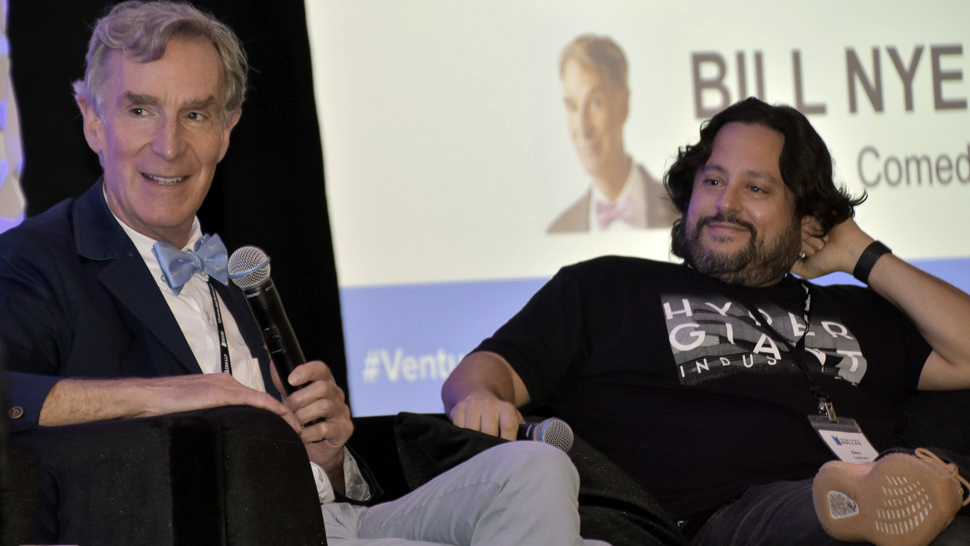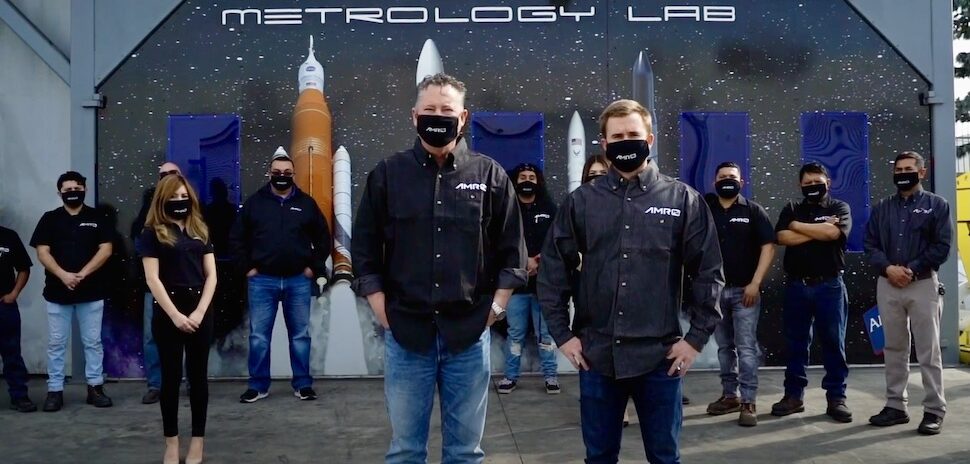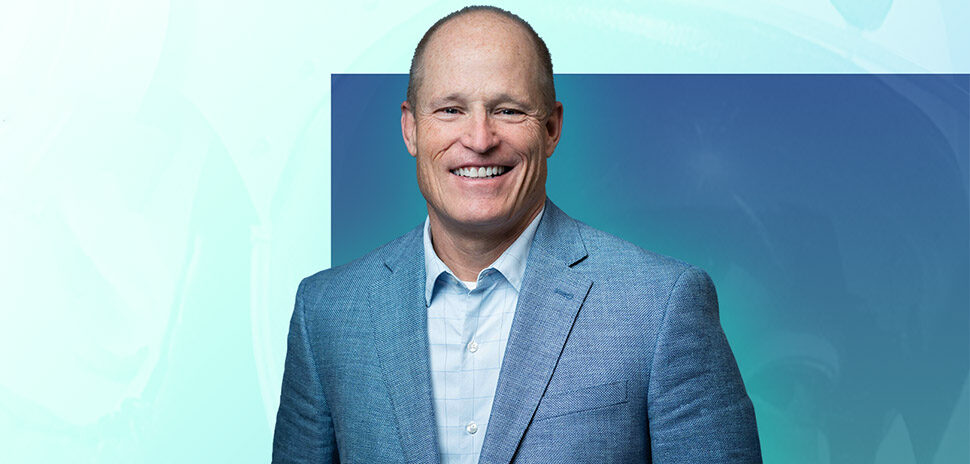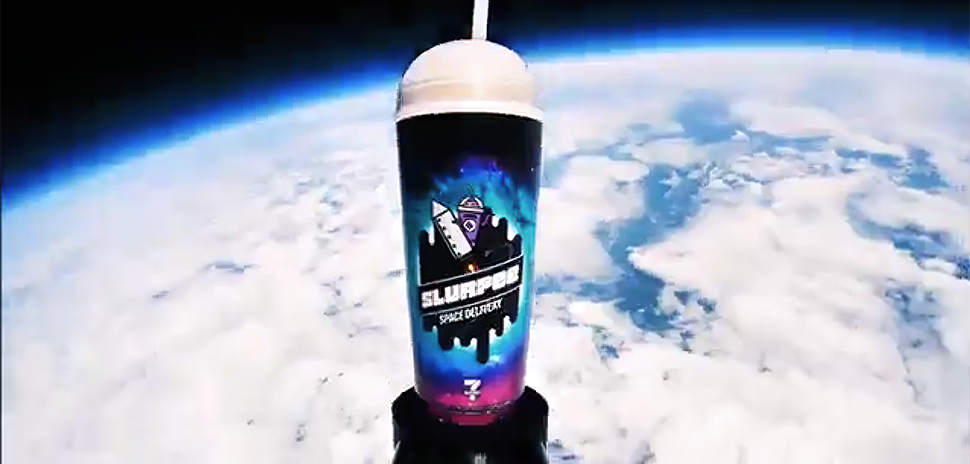Bill Nye and Hypergiant Industries Founder Ben Lamm both have a history with space—and each other.
Back in February, Texas-based artificial intelligence industrial complex Hypergiant launched a division that would focus on AI-driven aerospace and astronautic software and hardware for the space industry, called Hypergiant Galactic Systems.
The following month, Hypergiant Galactic Systems announced a partnership with the Arch Mission Foundation. Together, the two companies plan to launch a series of satellites, starting in 2020, that would serve as the first relay points in the Interplanetary Internet.
As for Bill Nye: Most people know him as the famous “Science Guy.” But, he’s also the CEO of The Planetary Society, the “world’s largest and most influential nonprofit space organization” dedicated to making advancements in science and exploration.
And most recently, Nye got a spot on Hypergiant’s Executive Advisory Board, which launched this summer. With his role, Nye intended to develop AI systems in two areas he deeply cares about: climate change and space exploration.
It’s an extension of what Lamm intends to do with Hypergiant Industries: change the way people think about various enterprise sectors but also the planet, technology, space, and what’s best for the entire human race.
On a Venture Dallas panel, Nye and Lamm came together with moderator Molly Cain, founder of GovCity Group, to talk about how America must consider the implications that technology advances can bring.
Launched by nine local dealmakers, Venture Dallas was a two-day summit that boosted relationships between local founders and out-of-town investors, putting North Texas even more on the map as an investment catalyst.
Here are our top takeaways. Lamm and Nye had lots to say on NASA, climate change, and game-changing ideas. For the record, when asked, “Who do you want to be when you grow up,” Lamm said, “Bill Nye.”
Ben Lamm
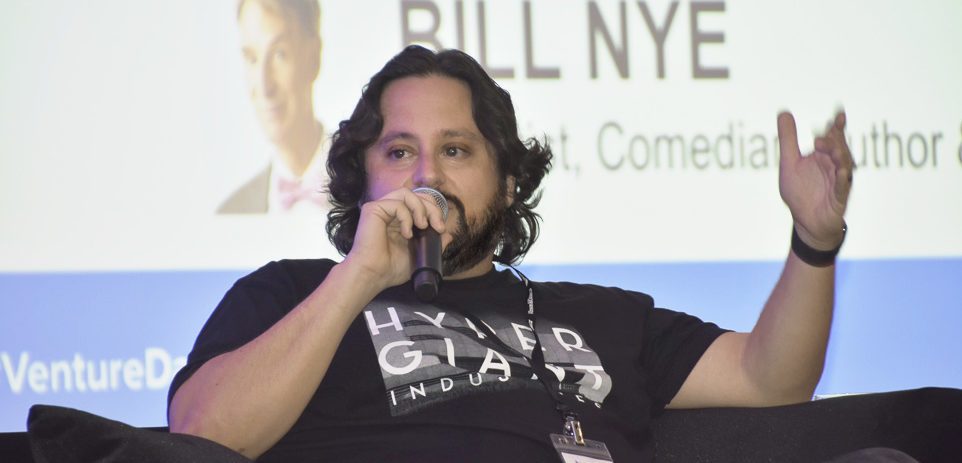
On becoming a space geek
“I went to Johnson Space Center with my Uncle Joe and had astronaut ice cream—I think I was 10. I thought it was the greatest thing ever. And I was like, if they’re making this kind of stuff, what could they, possibly be making? Then, about three years ago, I found out that all the astronaut ice cream has never been to space, and it’s just a big hoax.”
“I dove in over the years. I was very lucky just to get to see a lot of how NASA worked over the years.”
On how Hypergiant is involved in space
“We focus on the intersection of critical infrastructure and defense in space. We think that’s what makes life possible here —and potentially possible out there, at some point. It’s about a third of our overall focus and about 70 percent of our overall budget.”
On the possibilities for entrepreneurs
“I think it’s endless. There are so many problems in space … You’ve got applied materials, got physics people, and electrical engineers. Historically, space has been very hardware-focused and is becoming more software-focused. I think that you’re going to see more and more software players enter space.”
“There’s definitely money to be made. There are certain areas, like the search for life, that will be harder … but there is a lot that’s coming down in terms of things like data as a service.”
“Besides data as a service models, you’ve got AI and other kinds of software-based systems, leveraging the data that’s coming down from space and doing amazing things with it. Everything from crop rotation to geological studies, smart cities to infrastructure planning, and GIS to defense is being informed by the data. And there’s hardware—you’ve got people building reusable rockets.”
“You can put a full constellation of satellites into space, and be smart about constellation management. As stuff starts to degrade and fall out of orbit, you could ladder that— almost treated like a service. It’s significantly cheaper [compared to] launching one giant spacecraft: If that doesn’t work, it’s a big failure—hundreds of millions of dollars down the drain.”
On how ‘fail fast and ship’ applies to the space industry (or not)
“It can’t ‘just be good enough,’ especially when people’s lives are on the line in space.”
On tech for good
“We lose money every month on R&D, but it’s the greatest group ever.”
“Tech companies, specifically, and other industries have a responsibility to rise up where their companies and their employees’ passions are and divert some of that into these problems.”
“You don’t have to have an ocean cleanup company to clean up the ocean … You can take some of your revenue, some of the profit, and some of the great women and men that work at your company. If that’s their passion, you can support it.”
On climate change
“I’m pretty passionate about climate change. When you just look at data, you take out politics—one side versus the other. It’s just there are things out there that — if we don’t make changes — are going to kill us.”
“[Hypergiant] has an eight-person team that’s focusing on leveraging AI and building some pretty cool stuff that we’ll share soon—things we think could be transformative around climate change. And we want to be ‘planetary site advocates’ for space. We want to advocate for people finding these new technologies and creating open-source tech and communities for people to leverage to help make the world a better place.”
“In the short term we’re trying to help cities be smart with their planning and infrastructure, and we’re trying to help people at home have the tools and research they need to be successful and make changes.”
Bill Nye
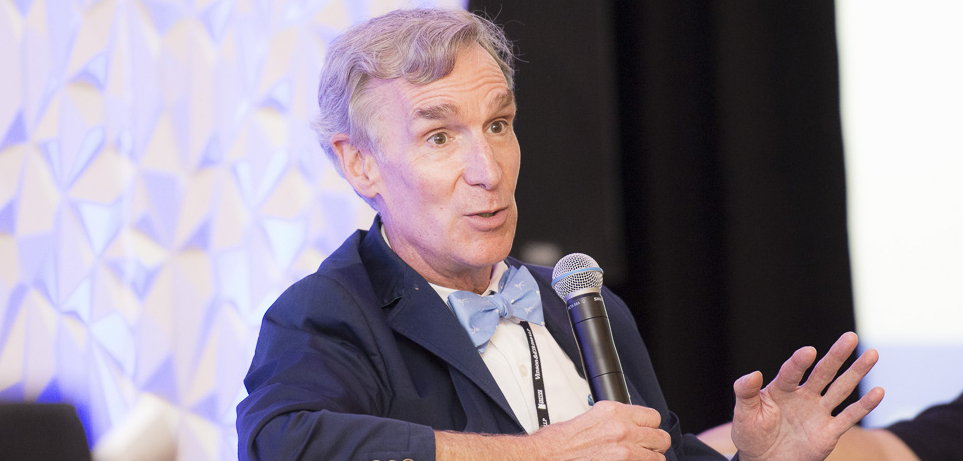
On how Carl Sagan changed his life
“For fun, I took one class from Carl Sagan, a very well-known astronomer, and it changed my life. You may have seen the original Cosmos series or the remake two or three years ago. But his class was pretty much that series before it was a series. And then he started the Planetary Society in 1980.”
On working with NASA
“NASA is still the biggest space agency by a factor of three or so. … When it comes to space exploration, people from both sides of the aisle participate. Everybody loves space: Republican, Democrat, Independent. Everybody thinks space exploration is a worthy use of our intellect and treasure.”
“Now with the miniaturization of electronics and instruments, much smaller organizations than NASA can participate in remarkable ways, advancing space science and exploration.”
On why space matters
“We all depend on space. It’s to the point where none of us can tell which side of the street we’re standing on. when we’re not working on our freaking phone. And that’s a result of the global positioning system.”
“I want to explore planets writ large. I want to look for methane and distant atmospheres or so-called exoplanets: Very cool. But two things for me: I want to look for life on another world. If we defined life on another world, it would change the course of history. Everybody would feel differently about being a living thing in the cosmos.”
On asteroids
“The other thing that’s important to me is: I don’t want the earth to get hit with an asteroid. If the ancient dinosaurs had a space program it wasn’t good enough.”
On investing in space
“In general, space improves the quality of life for everybody on Earth. What we want to do is ultimately provide clean water access, electricity, and internet access for everyone on the world—and that’s going to require a spacecraft.”
“We want space agencies to make decisions to have efficient exploration. Nominally there is no business case, for exploring Mars. You’re probably won’t make money, looking for life on Mars. But it would be extraordinary. And when you develop spacecraft and systems to do that, you create technology.”
On the challenge of space junk
“What you want are rockets that burn up on purpose. That’s another use of solar cell technology.”
On the need for “space policy”
“If you’ve been to Australia, they have tremendous trouble with invasive species. If you go to look for life on Mars and you bring along too many microbes from earth, you won’t be able to tell one from the other. So let’s all be thoughtful.”
“There’s a tremendous future, by the way, in space policy for sure. There’s many attorneys here, There’s a lot to be done in the laws associated with sharing space..”
On game-changing ideas
“I get an email about once a week for a meeting: Bring your game-changing transformative disruptive ideas to this meeting. Yeah, I should do that. Yes, I should have a transformative game-changing disruptive idea. But that’s generally not how it goes, everybody. It’s incremental.”
On climate change
“If people continue to resist the idea that we need to address climate change, these [game-changing] ideas are not going to emerge. For us on the science education side, climate change is the most serious problem humans have ever had.”
“Now there are 7.7 billion people on Earth—there are going to be 9 billion by 2050, and there might be 10 billion by 2060. So somebody’s gonna have to do something to feed all those people. And, we’re going to have less arable land. There’s less farmland due to desertification—we’re drying out some areas—and sea levels are rising. And the big thing is urbanization—more people want to live in cities. And so there’s less farmland, yet we are feeding everybody through genetic modifications and through improvements in agricultural technology, which is closely related to processing huge amounts of data. …All these problems are solvable because we can crunch a lot of data.”
“Space exploration is where we solve problems that have never been solved before. And I claim climate change is going to do the same thing. We’re going to be faced with enormous problems, and we’re going to figure it out.
“Climate change can help us all realize that we’re all in this together. And that, really, is a derivative of space exploration.”
On the big picture
“We are going to need big ideas, huge ideas, There’s three things we want for everybody in the world: Clean water, renewable electricity, and access to the internet for everybody on earth. When people say it can’t be done, and they wring their hands, I go crazy.”
“There’s nobody on earth who’s not involved in the future of Earth. I want us—humankind— to use space exploration to help us all understand that we are running the show now: Humans are in charge of the earth. It’s up to us to decide where the freshwater goes, where the saltwater goes, how we’re going to desalinate water, how we’re going to feed everybody, and how we’re going to make the world more peaceful.”
Comments were edited for brevity and clarity. Quincy Preston and Alex Edwards contributed to this report.
Dallas Innovates is a media sponsor of Venture Dallas 2019.
![]()
Get on the list.
Dallas Innovates, every day.
Sign up to keep your eye on what’s new and next in Dallas-Fort Worth, every day.

